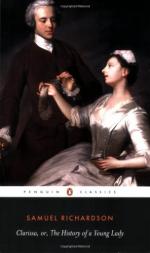You know, said I, and you can tell them, that I seldom eat suppers. My spirits are low. You must never urge me against a declared choice. Pray, Mr. Lovelace, inform them of all my particularities. If they are obliging, they will allow for them—I come not hither to make new acquaintance.
I have turned over the books I found in my closet; and am not a little pleased with them; and think the better of the people of the house for their sakes.
Stanhope’s Gospels; Sharp’s, Tillotson’s, and South’s Sermons; Nelson’s Feasts and Fasts; a Sacramental Piece of the Bishop of Man, and another of Dr. Gauden, Bishop of Exeter; and Inett’s Devotions, are among the devout books:—and among those of a lighter turn, the following not ill-chosen ones: A Telemachus, in French; another in English; Steel’s, Rowe’s, and Shakespeare’s Plays; that genteel Comedy of Mr. Cibber, The Careless Husband, and others of the same author; Dryden’s Miscellanies; the Tatlers, Spectators, and Guardians; Pope’s, and Swift’s, and Addison’s Works.
In the blank leaves of the Nelson and Bishop Gauden, is Mrs. Sinclair’s name; and in those of most of the others, either Sarah Martin, or Mary Horton, the names of the two nieces.
***
I am exceedingly out of humour with Mr. Lovelace: and have great reason to be so, as you will allow, when you have read the conversation I am going to give you an account of; for he would not let me rest till I gave him my company in the dining-room.
He began with letting me know, that he had been out to inquire after the character of the widow, which was the more necessary, he said, as he supposed that I would expect his frequent absence.
I did, I said; and that he would not think of taking up his lodging in the same house with me. But what, said I, is the result of your inquiry?
Why, indeed, the widow’s character was, in the main, what he liked well enough. But as it was Miss Howe’s opinion, as I had told him, that my brother had not given over his scheme; as the widow lived by letting lodgings, and had others to let in the same part of the house, which might be taken by an enemy; he knew no better way than for him to take them all, as it could not be for a long time, unless I would think of removing to others.
So far was well enough. But as it was easy for me to see, that he spoke the slighter of the widow, in order to have a pretence to lodge here himself, I asked him his intention in that respect. And he frankly owned, that if I chose to stay here, he could not, as matters stood, think of leaving me for six hours together; and he had prepared the widow to expect, that we should be here but for a few days; only till we could fix ourselves in a house suitable to our condition; and this, that I might be under the less embarrassment, if I pleased to remove.
Fix our-selves in a house, and we, and our, Mr. Lovelace—Pray, in what light—




